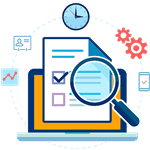 When embarking on the journey of writing a dissertation, one of the most crucial and challenging steps is collecting data. Data collection forms the foundation of any research project and plays a vital role in drawing accurate and meaningful conclusions. However, gathering dissertation data can be a complex and time-consuming task that requires careful planning, effective methodologies, and the right tools. This is where seeking our professional dissertation data collection help can prove to be immensely beneficial. At Thesis-Dissertation Writing Services, we understand the significance of reliable and comprehensive data in ensuring the success of your dissertation. We offer specialized dissertation data collection help to students who are looking to streamline their research process and obtain high-quality data. Our team of experienced researchers and statisticians is well-versed in various data collection methodologies and has expertise in utilizing a wide range of data collection tools. We provide you with access to a team of experts who possess in-depth knowledge of different research domains and can guide you in selecting the most appropriate data collection methods for your study. Secondly, we offer a wide array of data collection tools and software that are specifically designed to facilitate efficient data gathering and analysis. These tools not only save you valuable time but also ensure accuracy and reliability in your findings. Moreover, by seeking our data collection assistance, you can benefit from our experience in navigating ethical considerations and ensuring compliance with research protocols. We prioritize the confidentiality and privacy of your data, adhering to strict ethical standards throughout the data collection process. The collection of dissertation data is a critical aspect of your research, and seeking professional help can significantly enhance the quality and effectiveness of your study. We offer expertise, guidance, and advanced tools to simplify the data collection process, empowering you to focus on the analysis and interpretation of your findings. Let us assist you in collecting robust and reliable data that will strengthen the foundation of your dissertation.
When embarking on the journey of writing a dissertation, one of the most crucial and challenging steps is collecting data. Data collection forms the foundation of any research project and plays a vital role in drawing accurate and meaningful conclusions. However, gathering dissertation data can be a complex and time-consuming task that requires careful planning, effective methodologies, and the right tools. This is where seeking our professional dissertation data collection help can prove to be immensely beneficial. At Thesis-Dissertation Writing Services, we understand the significance of reliable and comprehensive data in ensuring the success of your dissertation. We offer specialized dissertation data collection help to students who are looking to streamline their research process and obtain high-quality data. Our team of experienced researchers and statisticians is well-versed in various data collection methodologies and has expertise in utilizing a wide range of data collection tools. We provide you with access to a team of experts who possess in-depth knowledge of different research domains and can guide you in selecting the most appropriate data collection methods for your study. Secondly, we offer a wide array of data collection tools and software that are specifically designed to facilitate efficient data gathering and analysis. These tools not only save you valuable time but also ensure accuracy and reliability in your findings. Moreover, by seeking our data collection assistance, you can benefit from our experience in navigating ethical considerations and ensuring compliance with research protocols. We prioritize the confidentiality and privacy of your data, adhering to strict ethical standards throughout the data collection process. The collection of dissertation data is a critical aspect of your research, and seeking professional help can significantly enhance the quality and effectiveness of your study. We offer expertise, guidance, and advanced tools to simplify the data collection process, empowering you to focus on the analysis and interpretation of your findings. Let us assist you in collecting robust and reliable data that will strengthen the foundation of your dissertation.
How to Choose Apt Data Collection Tools for Dissertation Research:
Selecting the most suitable data collection tools for your dissertation research is essential for obtaining high-quality data. Here are some key considerations to help you make an informed decision:
- Research Objectives and Questions: Start by clearly defining your research objectives and questions. This will guide you in determining the types of data you need to collect and the appropriate tools to use. Consider whether you require qualitative or quantitative data and whether you need to collect data from individuals or groups.
- Nature of the Data: Understand the nature of the data you wish to collect. For qualitative data, methods such as interviews, focus groups, and observations may be suitable. For quantitative data, surveys, experiments, or existing datasets may be more appropriate. Assess the strengths and limitations of each method for your research objectives.
- Feasibility and Practicality: Consider the feasibility and practicality of the data collection tools. Evaluate factors such as time constraints, available resources, access to participants, and the level of complexity involved in using a particular tool. Ensure that the chosen tools align with your research timeline and logistical considerations.
- Proper Deliberations: Take into account ethical considerations when selecting data collection tools. Ensure that your chosen methods respect the privacy and confidentiality of participants. Obtain necessary ethical approvals and consider any potential risks or harm associated with the data collection process.
How we can help with collecting dissertation data:
Gathering dissertation data can be a time-consuming and challenging process. We understand the importance of acquiring accurate and reliable data for your research. Our team of experienced professionals can assist you in realizing dissertation data efficiently and effectively. We can help you plan the data collection process, including selecting appropriate tools, designing interview protocols or surveys, and establishing data collection timelines. Our experts can guide you in conducting interviews, administering surveys, or collecting data through other methods. We can offer tips on participant recruitment, data recording, and ensuring data quality. Once the data collection is complete, we can assist with data analysis, helping you make sense of the collected information. Our experts can help with qualitative or quantitative analysis techniques, ensuring an accurate interpretation of your findings. Needless to mention, we prioritize ethical research practices. Our team can guide you through ethical considerations, ensuring that your data collection process respects the rights and privacy of participants.
Advantages of Interviews as a Data Collection Method for a Dissertation:
Among the various data collection methods available, interviews offer several advantages that make them a popular choice for dissertation research. Interviews allow for in-depth exploration of research topics. Researchers can ask open-ended questions, probe for detailed responses, and gain a deeper understanding of participants' perspectives, experiences, and emotions. They also provide flexibility in adapting questions and follow-up queries based on participants' responses. Researchers can explore emerging themes, clarify ambiguities, or delve deeper into specific areas of interest. Through interviews, researchers can gain insights into the social and cultural contexts that shape participants' experiences. This qualitative data can provide rich and nuanced understandings of complex phenomena. More relevantly, interviews facilitate direct interaction between the researcher and participants, fostering a sense of engagement and trust. This rapport can encourage participants to share more openly and provide richer data.
Dissertation Data Collection Guidance | Data Collection Tips
 Embarking on a dissertation journey can be an exhilarating yet challenging experience for any aspiring researcher. Among the crucial steps in this process is data collection, a stage that often presents unique obstacles and complexities. As a result, many students seek our expert help to collect dissertation data to ensure the success of this critical phase. We understand the significance of data collection in the dissertation process and offer comprehensive guidance and support to researchers at every step. When it comes to collecting data for your dissertation, our expertise can make a significant difference. Our team of experienced professionals has a deep understanding of various data collection methodologies and possesses the necessary skills to navigate potential pitfalls. We recognize that selecting the appropriate data collection methods, designing reliable instruments, and implementing effective sampling techniques can be daunting tasks. Therefore, we provide tailored solutions to meet the specific needs of your research. With our help, you can benefit from our extensive knowledge of data collection best practices. We offer guidance on selecting suitable research participants, devising effective survey or interview questions, and developing robust data collection protocols. Whether your research requires quantitative or qualitative data, we can assist you in ensuring the validity, reliability, and accuracy of your data collection methods. Moreover, we understand the time constraints and pressures that accompany the dissertation process. Our team can help streamline your data collection procedures, allowing you to focus on other critical aspects of your research. We are dedicated to providing prompt and efficient support, enabling you to meet your deadlines without compromising the quality of your data.
Embarking on a dissertation journey can be an exhilarating yet challenging experience for any aspiring researcher. Among the crucial steps in this process is data collection, a stage that often presents unique obstacles and complexities. As a result, many students seek our expert help to collect dissertation data to ensure the success of this critical phase. We understand the significance of data collection in the dissertation process and offer comprehensive guidance and support to researchers at every step. When it comes to collecting data for your dissertation, our expertise can make a significant difference. Our team of experienced professionals has a deep understanding of various data collection methodologies and possesses the necessary skills to navigate potential pitfalls. We recognize that selecting the appropriate data collection methods, designing reliable instruments, and implementing effective sampling techniques can be daunting tasks. Therefore, we provide tailored solutions to meet the specific needs of your research. With our help, you can benefit from our extensive knowledge of data collection best practices. We offer guidance on selecting suitable research participants, devising effective survey or interview questions, and developing robust data collection protocols. Whether your research requires quantitative or qualitative data, we can assist you in ensuring the validity, reliability, and accuracy of your data collection methods. Moreover, we understand the time constraints and pressures that accompany the dissertation process. Our team can help streamline your data collection procedures, allowing you to focus on other critical aspects of your research. We are dedicated to providing prompt and efficient support, enabling you to meet your deadlines without compromising the quality of your data.
Best dissertation data collection guidance:
- Define Clear Research Objectives: Start by clearly defining your research objectives and questions to guide your data collection efforts effectively.
- Select Appropriate Data Collection Methods: Consider the nature of your research and choose suitable data collection methods, such as surveys, interviews, observations, or experiments.
- Do Pilot Testing: Before starting your actual data collection, conduct a pilot test to identify any issues or areas for improvement in your data collection instruments or procedures.
- Develop Structured Data Collection Instruments: Design well-structured questionnaires, interview guides, or observation protocols to ensure consistent and reliable data collection.
- Establish Data Quality Controls: Implement measures to ensure data quality, such as double-checking responses, conducting periodic data audits, and using standardized data entry protocols.
- Maintain Clear Documentation: Keep detailed records of your data collection process, including dates, locations, participant information, and any modifications made during the study.
We can help you avoid dissertation data collection pitfalls
Our experienced team can guide you in selecting appropriate data collection methods, helping you align your research objectives with the most effective approaches. We can review and provide feedback on your data collection instruments, ensuring they are clear, concise, and aligned with your research objectives. More so, our experts can assist you in conducting pilot tests, analyzing the results, and refining your data collection instruments and procedures. Also, we offer data quality assurance services, including data cleaning, validation checks, and statistical analysis, to ensure accurate and reliable findings. If you encounter any issues or challenges during your data collection phase, our team is available to provide timely guidance and support.
Best dissertation data collection techniques for you
- Surveys: Learn how to design effective surveys, select appropriate sampling techniques, and analyze survey data using statistical software.
- Interviews: Understand the different types of interviews, learn how to conduct structured or semi-structured interviews, and gain insights into analyzing interview transcripts.
- Observations: Explore the nuances of observational studies, including participant observation, non-participant observation, and systematic observation, and understand how to record and interpret observational data.
- Experiments: Gain knowledge about experimental design, control groups, variables, and statistical analysis techniques specific to experimental research.
Efficient data collection is crucial for the success of your dissertation project. If you follow the practical tips we have outlined in this article, you can streamline your data collection process and ensure the reliability and validity of your research findings. Furthermore, our assistance can help you navigate through the common pitfalls and challenges associated with data collection, allowing you to focus on producing high-quality research. With our data collection guide, you can gain a comprehensive understanding of various data collection techniques, empowering you to conduct your dissertation research with confidence and precision.




 Embarking on a dissertation journey is a significant undertaking that requires meticulous planning and execution. One crucial aspect of this process is data collection, which serves as the foundation for conducting meaningful research and generating insightful findings. However, amidst the pursuit of knowledge, it is essential to recognize the ethical considerations surrounding data collection to ensure the rights, privacy, and dignity of participants are upheld.
Embarking on a dissertation journey is a significant undertaking that requires meticulous planning and execution. One crucial aspect of this process is data collection, which serves as the foundation for conducting meaningful research and generating insightful findings. However, amidst the pursuit of knowledge, it is essential to recognize the ethical considerations surrounding data collection to ensure the rights, privacy, and dignity of participants are upheld.  We guarantee you the
We guarantee you the 